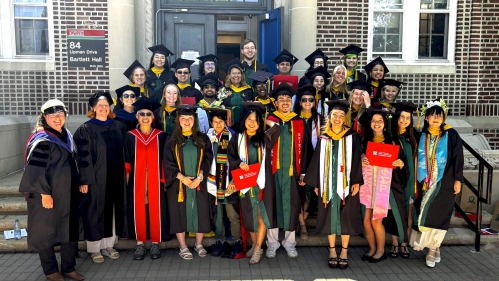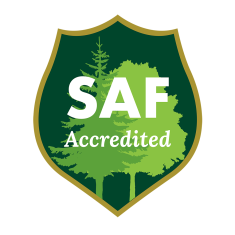
About the Ecology, Evolution, and Natural Resources (EENR) Undergraduate Program
The mission of the Undergraduate Program of DEENR is to integrate academics, research and outreach in the areas of ecology, evolution and natural resources. We cultivate a fundamental understanding of the biological principles that regulate living systems, and develop proficiencies in field and laboratory techniques. Our program puts high value of the development of quantitative and critical thinking skills, and we encourage independent intellectual growth, including a required Senior Capstone (11:216:499) experience. Overall, we provide students with a first-rate education that will serve as a solid foundation for all employment and graduate school opportunities in our discipline.
Track Options in the Major
The undergraduate program in Ecology, Evolution, and Natural Resources offers three distinct major tracks to best accommodate the interests and career goals of our students.
EENR General Track
If you want the most flexibility to customize your degree by selecting courses based on your interests and/or if you would like to focus your studies on evolutionary biology (e.g., Zoology, Botany, biodiversity), this might be the best track for you. Students in this track get the broadest training and preparation for a wide range of careers and graduate programs.
Urban Forestry Option
If you are interested in a career in urban forestry, such as becoming an urban forester, arborist, forest ecologist, or consulting forester, this could be the track for you. It emphasizes hands-on forestry skills with courses like Urban Forestry and Arboriculture.
Natural Resources and Ecosystem Management Option
If a career in natural resources is your goal, this track will help prepare you. Possible careers include forester, ecologist, wildlife biologist, parks and recreation manager and conservation biologist. The track includes courses focused on wildlife ecology, biology, and forestry.
The NREM and the Urban Forestry tracks are more prescriptive with more specific course requirements because they are accredited by the Society of American Foresters (SAF) under the natural resources and ecosystem management and urban forestry standards. The advantage of graduating form an SAF accredited program is it immediately links the student with a national community of students in similar programs while opening up a series of student-centric professional development opportunities beyond the school. This leads to a qualification for professional practice credentialling. Graduating from such a program represents a fulfillment of a common requirement or heavy preference in state/federal level job hire processes in forestry or natural resource management.

Both the NREM and Urban Forestry Tracks are accredited by the Society of American Foresters.
Program Learning Goals for EENR Students
Upon completion of our major, we expect our students to have mastered:
- Goal 1: Explain basic population, community ecology, and ecosystem-level concepts.
- Goal 2: Describe the evolutionary origins, processes, and patterns over geologic time.
- Goal 3: Create a natural resource management plan demonstrating an understanding of societal values and interests.
- Goal 4: Effectively utilize software, hardware, field, and laboratory techniques commonly used in the study of ecology, evolution, and natural resource management.
- Goal 5: Use quantitative methods to analyze and understand ecological systems, including interpretation of numeric and graphical data.
- Goal 6: Communicate effectively orally and through written text and graphics.
- Goal 7: Evaluate ecology, evolution, and natural resource management concepts in a global context.
The EENR curriculum is quite broad, since it provides an understanding of how natural living systems function and evolve, and how organisms can be managed to conserve biodiversity while providing benefits to people. To achieve these goals, we utilize a range of teaching techniques, including lectures, hands-on lab, field, and computational experiences, individual and group projects based on real world problems. These in-class experiences complement the SEBS experiential learning requirement that can include conducting research or completing a teaching or professional internship.
Students are guided to pursue course work that prepares them for traditional careers in resource management, or they may take a broader array of courses to meet interests related to the conservation of natural resources, and the ecology and evolution of natural systems. As such, the exact combination of courses will differ from student to student. However, successful completion of the 9 required core courses will ensure all core learning goals are met. In addition to the general major curriculum, we offer two specialized disciplinary tracks with a more focused sequence of courses in 1) Natural Resources and Ecosystem Management, or 2) Urban Forestry (urbanforestry.rutgers.edu). Each specialized track features electives that contribute to meeting additional learning goals:
Natural Resources and Ecosystem Management Track Specific Learning Goals:
- Goal 3a: Utilize common forestry inventory methods and apply a fundamental knowledge of silviculture and ecology to create a forestry management plan that fosters the long-term capacity of the land and demonstrates an understanding of societal values and interests.
- Goal 8: Evaluate conflicts and dilemmas through a lens of professional ethics.
- Goal 9: Describe natural resource relevant laws and policies in New Jersey and at the national level.
Urban Forestry Track Specific Learning Goals:
- Goal 3b: Utilize common urban forestry analysis tools to create a community forestry management plan demonstrating an understanding of societal values and interests as well as the long-term capacity of the urban forest.
- Goal 10: Apply a fundamental knowledge of tree biology and professional ethics to tree care management and practice.
- Goal 11: Describe urban forestry relevant laws and policies in New Jersey and at the national level.
Where/How are Program Learning Goals Achieved
The general EENR track is quite broad, since it provides an understanding of how natural living systems function and evolve, and how organisms can be managed to conserve biodiversity while providing benefits to people. Within this track, students are guided to pursue course work that prepares them for their chosen career paths in resource management, conservation of natural resources, and/or the ecology and evolution of natural systems. As such, the exact combination of courses will differ from student to student. However, successful completion of the 9 required core courses will ensure all learning goals are met. The department website clearly lists our major requirements, courses (color coded by semester), and certificates. See courses sorted by Departmental Learning Goal.
The new UF and NREM tracks are more structured, with additional courses required to address the associated additional learning goals. Students in these tracks will be guided to the necessary specific courses (detailed curriculum map pending).
How are Program Learning Goals Assessed?
The assessment of outcomes within the Department of Ecology, Evolution, and Natural Resources is evaluated directly by individual faculty within the classes that they teach using direct measures from projects and examinations and indirectly through course evaluations. Every course in our curriculum now has a syllabus and course description, and all of the courses now have explicit learning goals associated with them. The most popular tool employed by our faculty is the use of formative assessment, whereby students are iteratively provided feedback to advance learning gains.
We also continue to employ the direct measures from projects and examinations and through course evaluations. In addition, we have two additional sources of student-centered data. The first is an initial entrance survey to assess student interests and motivations for entering the major. In addition, this survey covers issues related to advising and is designed to improve the efficiency and transfer of information during the advising process, and assess the effectiveness of advising. The second survey is a Senior Exit Survey that is used to assess student perception of the curriculum and advising process, and for students' perceptions of their preparedness for their future. We also now teach a mandatory Senior Capstone course (11:216:499), which in addition to the exit survey will close the loop on our assessment strategies. In the capstone course, the students create an online portfolio that encompasses a set of current skills and knowledge backed with evidence in the following form:
- Relevant coursework and associated exemplary projects
- Relevant experience including lab and fieldwork
- A downloadable resume/CV
- A personal statement, including identification of desired career paths
Undergraduate Program Director
Kimberly Russell
ENR Building, Rm. 124
Phone: 848-932-9383
Email: russell@sebs.rutgers.edu